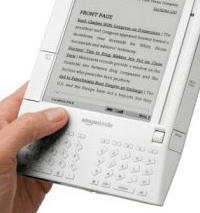Stop the Kindle hype!


The bewildering comments have come from onlookers conflating Amazon's moves in the e-book and audio book markets. This is all about Amazon's recent purchase of Audible and the Kindle player — two completely different markets in my book.
For example, here's a slice from the American Public Media's radio show called MarketPlace. On Monday, host Kai Ryssdal talked with Kevin Periera of G4 about green gadgets. That discussion included the Kindle (Ryssdal called the Kindle "ugly").
RYSSDAL: Let me get you to the marketplace of this thing for a second. Amazon just bought Audible, Audible.com.
PEREIRA: Right.
RYSSDAL: Is that combination, when you wrap it up in the Kindle, sort of the death of the paperback, maybe not today but in five years?
PEREIRA: Yeah, certainly not today, but yes five to 10 years from now. This is absolutely the future of that, and plus that little device that you're holding in your hand does play MP3s and has a headphone jack, so the perfect combination of Amazon's digital book downloads and the Audible you know podcasts, audiocasts, books on tape.
Dudes, what's the 5 or 10 years? There's already on the market the perfect device and service for audio books, podcasts and such. It's called the iPod! Remember it? I even listened to the podcast of the show on the iPod nano hanging around my neck, not from a 5.3-by-7.5-inch device that weighs 10.3 oz.
Why would we want to carry around a book reader for audio content anyway? To drain the battery so we can't read our 200 books?
For some reason, the buzz about the Kindle keeps growing, perhaps because it's unavailable. The first manufacturing run of the device sold out, but Amazon isn't forthcoming with specifics about how many were sold. The best guess is that the coverage should really be more about how few of them were sold.
A Flickr post by one Gubatron that showed a photo of a young woman reading with a Kindle outside the New York subway generated a lot of steam. It was picked up by a number of sites.
Eventually this is what the subway will be like in the future, everybody holding digital books, to read books, blogs, news... no more deciding which book to bring with us today.
The photographer said the woman with the Kindle must have "something to do with Amazon... ." Perhaps a more-likely bet might be that she has something to do with an advertising agency seeking to maintain the lukewarm buzz about the device.
This subway Kindle user appears to be unworried about using the device out in the open. I found no report that anyone had stolen the Kindle on the subway. Now, that's the mark of a real hot product: it's when kids steal the devices out of customers' hands (or in the case of iPods from around necks) on the subway.
Despite the many online stories and Amazon's claims of mass shipments and how it's having to scramble to keep up with demand, it's hard to see that the world is ready to move to e-books as it has for digital music players.
Unlike Steve Jobs, who told John Markoff that "the whole conception is flawed at the top because people don’t read anymore” while pointing to the statistic that 40 percent of Americans read one book or less last year (and much of that must have been Harry Potter), I can conceive of an e-book being useful and popular. However, none of the devices on the market are compelling, not in their price or their capabilities.
The iPod was successful because flash and tiny-HDD audio players are better technology for portable audio than CD-based players and because the services on the iTunes store and the cross-platform iTunes software glued everything together and made everything so easy for customers. It is a platform now.
Perhaps it's not about the book format at all? I remember trying out a number of "personal viewing" technologies at the Society for Information Display conference a couple of years ago that project digital images into your retina. The resolution of these images can be higher than the e-ink technology used in the Kindle and Sony screens. And even better, they would work with the standard portable content device, the iPod.
However, the current range of such viewers, such as the Myvu solo for the iPod, are focused on video projection and low cost, instead of higher resolution for text reading applications. The Myvu solo supports 320x240 in 24-bit color at 50–60Hz.
With an iPod Touch and a high-resolution retinal viewing technology, we could have a nice device for reading e-books as well as listening to audio books.